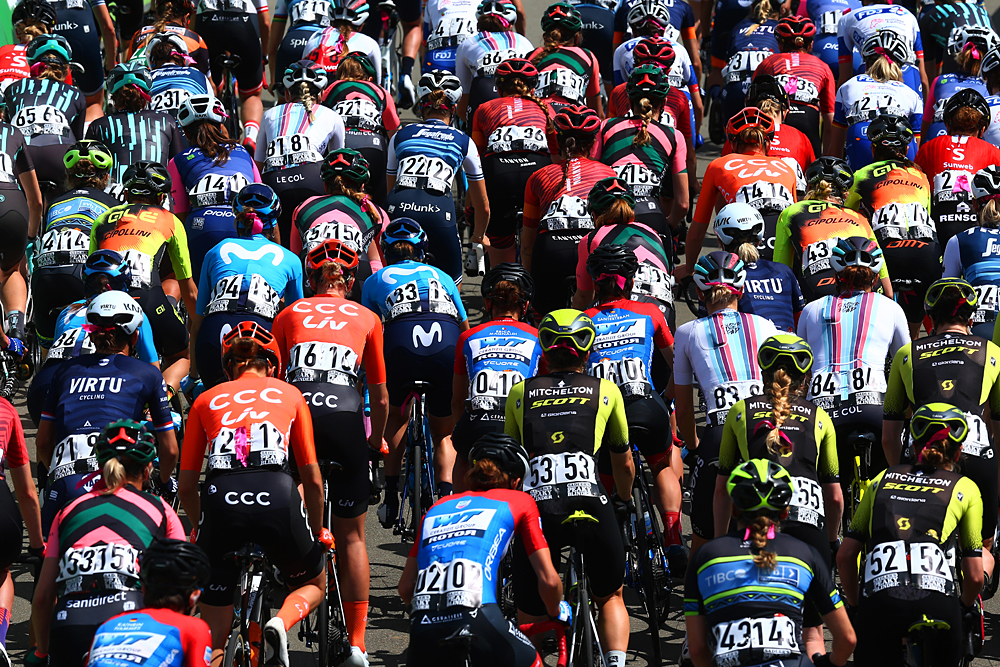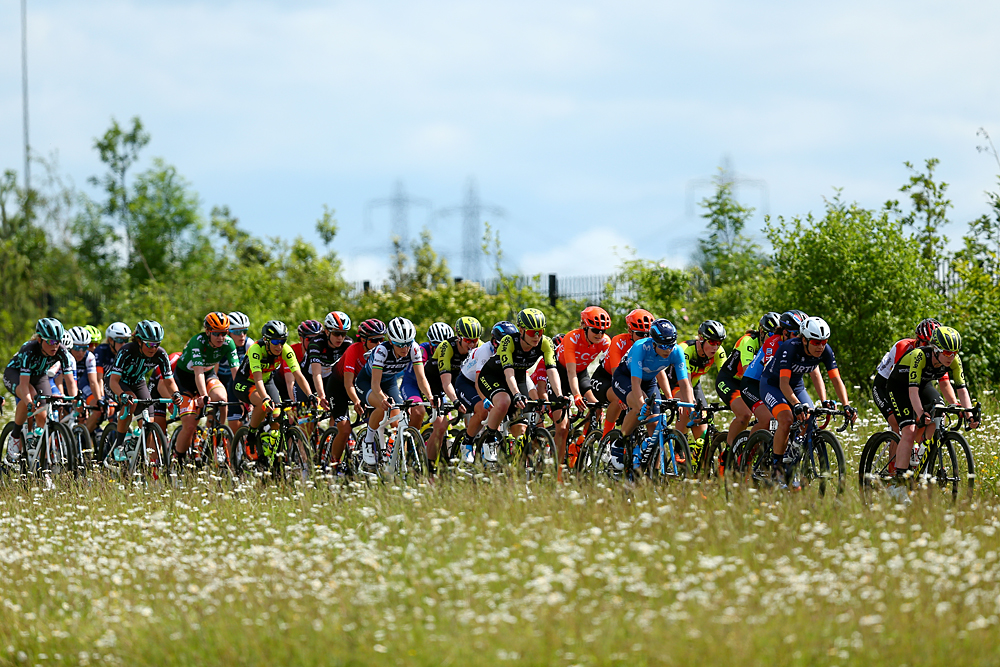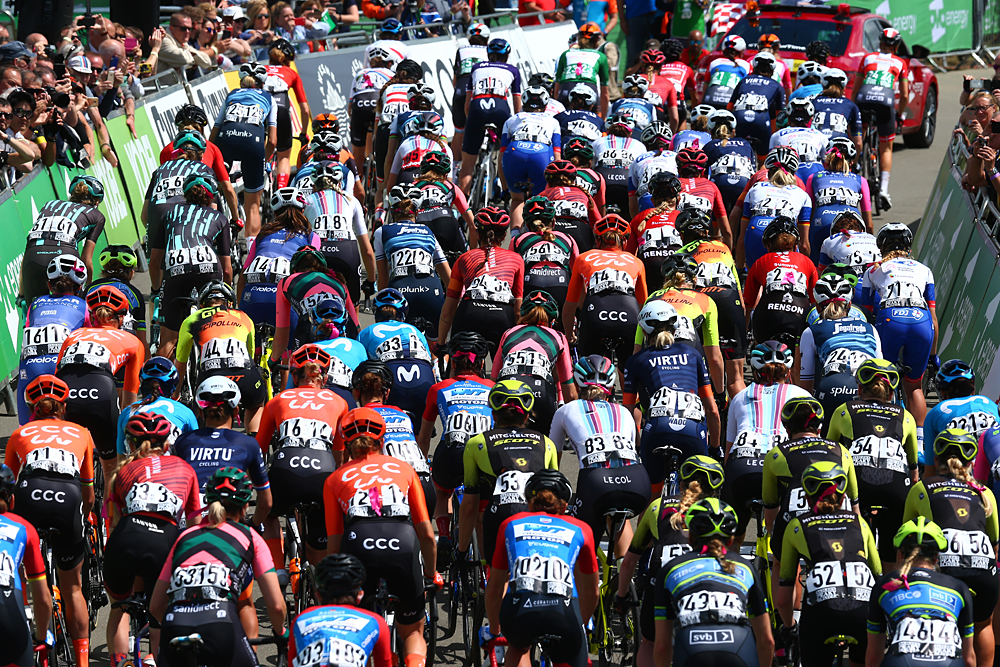Slappendel urges cyclists to file formal complaints with UCI against abusers
'It's the only way to get these people out of the sport' says head of The Cyclists' Alliance





Iris Slappendel, head of The Cyclists' Alliance, has urged cyclists to file formal complaints with the UCI Ethics Commission and Safe Sport programs if they find themselves in situations of abuse on a cycling team or witness abuse within the sport.
Slappendel spoke with Cyclingnews after we reported that three riders had formally reported allegations of abuse against Health Mate Ladies Team manager Patrick Van Gansen.
In the wake of that report, six more riders have come forward to corroborate those allegations; five riders wrote an open letter describing their experiences to the Dutch news outlet WielerFlits, and Liz Hatch confirmed similar experiences while racing on his team in 2013 in an interview with Het Nieuwsblad. All riders have alleged that Van Gansen was verbally aggressive and made sexually inappropriate remarks toward them.
Slappendel said that filing a complaint is the best way to protect the riders and the sport from offenders.
"It's very much case-by-case but it's important that the riders who experience these types of situations file a formal complaint, even though it is not an easy process," Slappandel told Cyclingnews. "It's the only way to get these people out of the sport."
Cyclingnews reported on Tuesday that Esther Meisels, Sara Mustonen and Chloë Turblin all left the Health Mate Ladies Team in the last three months.
Meisels and Mustonen, and Turblin's father had separately filed formal complaints against Van Gansen with the UCI Ethics Commission. Their complaints centre around the UCI Code of Ethics: Appendix 1, which covers protection of physical and mental integrity, sexual harassment and abuse.
Get The Leadout Newsletter
The latest race content, interviews, features, reviews and expert buying guides, direct to your inbox!
Van Gansen has denied all of the allegations levelled against him and told Cyclingnews that he intends to take legal action against the women who have accused him of abuse and inappropriate behaviour.
The Cyclists' Alliance is an association that represents the competitive, economic, personal interests of all professional women cyclists, advocating for fairness and equality and providing assistance in resolving all types of disputes.
The association also helps riders with the process and procedure of filing formal complaints with the UCI Ethics Commission, by providing them with the appropriate point of contact and explaining what details need to be included in a formal complaint. They also help answer questions such as: How do I get out of an abusive situation? What should I do when I am in an abusive situation? And specific questions concerning different types of abuse such as psychological, physical, sexual, financial, and emotional harm by abusive coaches.
Slappendel told Cyclingnews that any rider, whether they are a member of The Cyclists' Alliance or not, can contact the association if they are experiencing abuse within the sport. As is the case with the UCI Ethics Commission, for purposes of confidentiality, any discussions surrounding such cases will remain confidential with The Cyclists' Alliance.
"They can always call us. They don't have to be a member in order for us to help riders who are in these types of situations. It helps [for the riders] to realise that this is not normal behaviour. It's important to make the sport safer and to help protect their sport.
"In the end, it's the rider who has to take the step to file the complaint.
"In short, riders can come to us and we connect them with the UCI Ethics Commission and advise them on what they will need to provide to make a formal complaint. Now, a rider can also file a complaint anonymously."
The Cyclists' Alliance published a statement regarding the Health Mate Ladies Team case on its website at Twitter channel Monday. "We do support the riders that have spoken out, and also through our legal network. It's up to the UCI Ethics Commission and relevant official bodies to make a verdict in this case, but we will make sure just and effective measures are taken by these bodies.
"If there are any riders that seek help, legally or in any other way, you can reach us through the contact details below. In trust we will always respect your privacy."
Slappendel raced professionally for over a decade beginning in 2004 and retiring from the sport in 2016. She raced for teams Flexpoint, Cervelo Test, Garmin-Cervelo, Rabobank and ended her career with UnitedHealthcare.
She also spent one year (2015) racing for Bigla Pro Cycling, and was one of 10 riders to file complaints against manager Tomas Campana. However, half withdrew when they found out that their names would not be anonymous and that they would be public knowledge to Campana. In addition, the events in the indictment happened in 2015 and under an older version of the Code of Ethics that did not include teams or staff.
In an article published in the Dutch newspaper de Volkskrant last November, it emerged that Campana was accused of abusing his power as the head of the team. The allegations included bullying, fat shaming, intimidating riders, insulting riders in front of other team members, pulling riders from races if he didn't like something they had done, ignoring medical concerns such as a concussion and an episode of heart palpitations, trying to control riders' diets and not paying prize money.
Van Gansen denies all allegations and provided a personal statement that confirms his intent to take legal action published on the Health Mate Ladies Team website.
UCI Ethics Commission
The UCI updated its Code of Ethics last November to better protect athletes in cases of harassment and abuse to include three main changes.
The first is better 'anonymity of plaintiff' to protect the victim's privacy in Article 26.2. Two other changes are concerning Appendix 1, Article 3.2, which now allows for dedicated reporting channels for filing complaints and for teams to identify a person of contact who has the right to collect information relating to situations of sexual harassment and abuse, and take action with the UCI Ethics Commission on behalf of a team or rider.
The updated Code of Ethics now applies to teams and staff.
The need for amendments was spurred on by the International Olympic Committee's (IOC) introduction of the Safeguarding Toolkit that aims to assist National Olympic Committees (NOC) and International Federations (IF) in the development of policies and procedures to safeguard athletes from harassment and abuse in sport.
UCI Complaint Protocol:
It's important to follow the correct channels and take the proper steps when filing a complaint with the UCI Ethics Commission, so that information is properly received and that the information provided is correct.
Contact: secretariat@uci-ethics.ch
As noted in the Code of Ethics, the Secretariat of the Ethics Commission is dealt with by a secretary appointed by the UCI Management Committee. The secretary is independent from the UCI and possess adequate legal qualification. The contact details of the Secretariat are published on the UCI website (and above). Matters must be brought before the Ethics Commission in writing (email) and addressed to the Secretariat. Note that notifications will only be considered if sent to the email address of the Secretariat published on the UCI website.
What to include in a complaint (Article 26.2):
• Name and surname of the sender
• Full contact details of the sender
• Name and surname of the person(s) concerned by the alleged violation
• The facts of the matter referred
• Any and all evidence in the sender’s possession
• Provision(s) of the Code potentially breached
• Signature of the sender
What happens next?
The Secretariat will register a file and send it to the President of the Ethics Commission and inform the UCI President of the registration of a new file. The President of the Ethics Commission will proceed to a 'prima facie' examination of the case [the sender will receive a letter via email from the President of the UCI Ethics Commission informing that the complaint has been received - ed.].
The President of the Ethics Commission with then determine whether there is any indication that a breach of the Code may have been committed. The President of the Ethics Commission may later request additional information and documentation from the sender of the complaint or denunciation or any person bound by the Code, before deciding to initiate proceedings. (Article 27)
A panel of three members is assigned to deal with the case and they provide a copy of the case file to the parties [note that the person who files a complaint is not a party to the case - ed.]. (Article 28 and 29).
The panel will then begin an investigation by way of written and oral communications with the parties and witnesses, and may call such persons into a hearing by video conference. The panel will accept appropriate evidence and witnesses, who will remain unidentified. (Article 30)
The panel will then close the investigation phase and deliberate to decide, if any, which of the list of sanctions to impose. (Article 38.4)
There is a 10-year statute of limitations.
To read the full process click on the link to the UCI Code of Ethics here.
Safe Sport - Canada, US, Australia and Netherlands
Although cyclists are encouraged to file complaints with the UCI Ethics Commission there are other pathways such as filing complaints with your national federation, if it has a process in place, or with various safe sport programs set up by sport governing bodies in some countries. Also cyclists experiencing abuse can communicate with a personal lawyer and local authorities.
In February, the CBC reported following an investigation that least 222 coaches involved in amateur sports in Canada have been convicted of sexual offenses in the last 20 years. More than 600 of those athlete-victims were under the age of 18.
The Government of Canada is attempting to make its sports system safer by launching two initiatives under Safe Sport for All: A third-party investigation unit set up through the Sport Dispute Resolution Centre of Canada (SDRCC), and a national toll-free, confidential helpline for victims and witnesses of abuse in sport. The initiative is meant to address harassment, abuse and discrimination in sport.
It provides professional listening and referral services by phone and text at 1-888-83-SPORT (77678) and by email at info@abuse-free-sport.ca, from 8 a.m. to 8 p.m. ET, seven days a week. For more information, visit www.abuse-free-sport.ca.
In April, Canadian high-performance athletes convened in Toronto for an Athletes Canada Safe Sport Summit to address the concerns around athletes safety in sports and to look at ways of changing safe sport policies within each sporting federation.
The US Center for SafeSport is also committed to ending abuse in sport by addressing bullying, harassment, hazing, physical abuse, emotional abuse, and sexual misconduct and abuse.
According to its website, the center provides services to sport entities on abuse prevention techniques, policies and programs and provides a safe, professional and confidential place for individuals to report sexual abuse within the US Olympic and Paralympic Movements.
USA Cycling will soon be providing a Safe Sport handbook link on its website, but currently offers a place to file a reports on sexual misconduct, other misconduct, along with training, back ground checks and FAQ.
The Cyclists' Alliance lists a host of other nations that offer support services such as Play By The Rules in Australia and Vertrouwenspunt Sport in the Netherlands.
Women's cycling is continuing to develop and there has been a push create more media coverage and better work-place environment for athletes that includes standard contracts, social insurances and minimum salaries for top-tier teams beginning next year. There is still a long way to go but one of the biggest priorities should be placed on athletes' safety.
"We commend any rider who is brave enough to speak the truth," The Cyclists' Alliance wrote in a post on Twitter. "Times are changing and there is more support and better pathways for victims to be helped, and so that this kind of thing doesn’t happen in the future. If you need help, we are here."

Kirsten Frattini is the Deputy Editor of Cyclingnews, overseeing the global racing content plan.
Kirsten has a background in Kinesiology and Health Science. She has been involved in cycling from the community and grassroots level to professional cycling's biggest races, reporting on the WorldTour, Spring Classics, Tours de France, World Championships and Olympic Games.
She began her sports journalism career with Cyclingnews as a North American Correspondent in 2006. In 2018, Kirsten became Women's Editor – overseeing the content strategy, race coverage and growth of women's professional cycling – before becoming Deputy Editor in 2023.